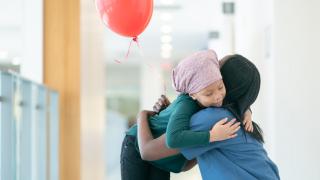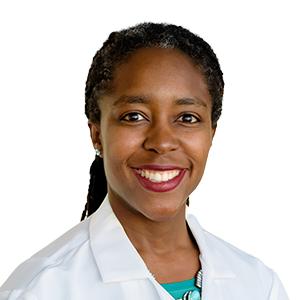When she was a little girl growing up in St. Petersburg, Florida, Natalie Kelly, Ph.D., ABPP-CN, dreamed of becoming a pediatrician.
“I always loved children and wanted them at the center of my work,” she recalled.
Fast forward to today, and you’ll indeed find her working with young people, but from a slightly different angle.
As a neuropsychologist in City of Hope’s Department of Supportive Care Medicine, Kelly specializes in the complex relationship between brain and behavior. She handles evaluations, assessing a patient’s cognitive functioning, including “executive functions” — intricate mental skills, such as organization, short-term memory, self-control, planning and others. Cancer treatment can impact any or all of these, making recovery frustrating for many patients, especially children.
Kelly answers the call when a young cancer patient is having problems after treatment. It’s not unusual for chemotherapy to affect a child’s ability to learn, focus and avoid distractions. “I help support their return to normal,” she said. “Back to school, back into their community, as smoothly as possible.”
The would-be pediatrician began to develop a fascination with the brain as an undergrad at Vanderbilt University, where she studied child development. Two things happened which nudged her in that direction.
World-famous neurologist and author of "Awakenings" Oliver Sacks came to speak, she remembered. “And I was just amazed … it was so fascinating to me.”
Inspiration also came from home. Her mother, a physical therapist, exposed Kelly to the brain/behavior relationship in a rehab setting. “Mom came home with a newsletter with a brain on the cover,” recalled Kelly. It piqued her interest and propelled her into neuropsychology. Kelly went on to accumulate a long and formidable list of credentials, reflective of her passion.
An Uncommon Career Path
She is the rarest of rare birds: An African American woman board-certified in both neuropsychology and pediatric neuropsychology, working in an oncology setting. It’s worth taking a moment to consider just how unusual that is.
Of the 106,000 licensed psychologists in the U.S., only about 5,000 are neuropsychologists. Roughly half are male — a sharp contrast to the numbers in general psychology, where women dominate.
Furthermore, no African American had been board-certified in neuropsychology until Emory University’s Anthony Stringer did it in 2004.
Most neuropsychologists focus on dementia, stroke, epilepsy or traumatic brain injury. Only a handful deal with cancer, fewer still with cancer in children.
In fact, Kelly trained originally to treat children with epilepsy. A one-year rotation involving young brain tumor patients changed her mind. Not only did she find the field intellectually stimulating, but more important, she saw the opportunity to forge long-lasting relationships with patients.
“We all find our calling,” she said. “I want to help children and families who are suffering.”
At City of Hope since 2011, Kelly has demonstrated a true gift for this work that goes beyond degrees, certifications and technical skill.
“I was motivated to bring her to City of Hope because of her strong professional training and background,” recalled Sunita Patel, Ph.D., associate professor in the Department of Supportive Care Medicine, “and because she came across as warm and kind. Neurological assessments can easily become dry and all about the cognitive data, but Dr. Kelly infuses a compassionate, human side to the service.”
Longtime friend and colleague Sherry Hite goes further:
“Dr. Kelly is one of the most incredible women I know,” said Hite, City of Hope’s Occupational Therapy Department manager. “She has an incredible soul filled with compassion.”
She wears that compassion well. Being around young cancer patients every day can take an emotional toll, especially when a child does not survive. Many doctors talk of “compartmentalizing” or “keeping a professional distance” in order to maintain their own equilibrium. Kelly leans heavily on the family-like camaraderie provided by her supportive care colleagues. “Knowing I can go to them is huge,” she says.
As for her own family, Kelly makes sure to carve out quality time for her physician husband and their two daughters, ages 7 and 9. They love “staycations” and anything artistic, from doing pottery to letting go on the dance floor with their favorite tango and salsa moves. (“She’s an awesome dancer!” said Patel.)
Through it all, Kelly constantly reminds herself of her role with each patient, savoring “moments in time,” and giving thanks for those “gifts,” regardless of the outcome.
She feels privileged to experience those moments at City of Hope with patients she calls “the best in the world. They’ve been suffering and yet they have this level of gratitude, generosity, openness. They are really kind people and down-to-earth. ”
Kelly wants the next generation to experience those feelings, too. She is especially determined to stand as both role model and mentor for an increasingly diverse group of future neuropsychologists; she directs City of Hope’s neuropsychology clerkship and trains local, doctoral-level psychology students. “I recognize I have this unique set of skills,” she said, “so I feel this opportunity to share the knowledge that I have.”
One more thing Kelly wants to share: a message she communicates daily to patients, and people who may one day become patients.
“Take a deep breath,” she says. “Take it one step at a time. If you come to City of Hope, your care will be thorough because we all have the same goal as you: to help you live your best, full life. We will do all in our power to make that happen.”

